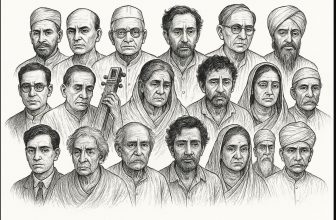History is often told through the lens of great wars, legendary rulers, and defining moments of civilization. But hidden beneath the well-documented past are bizarre, mysterious, and downright unbelievable events that defy logic. These are not myths or folklore—they actually happened but remain largely forgotten.
From a Mughal emperor’s accidental death to a supernatural epidemic that saved a kingdom, these events are stranger than fiction. Some changed the course of Indian history, while others remain unsolved mysteries that continue to puzzle historians today.
In this list, we uncover 10 of the most bizarre but true events in Indian history that no one talks about—but absolutely should.
1. The Mysterious Death of Mughal Emperor Humayun (1556)
One of the most bizarre and unexpected deaths in Indian history was that of Mughal Emperor Humayun. Unlike emperors who perished in battle or due to assassination, Humayun met his end in a strangely ordinary yet tragic accident.
On January 27, 1556, Humayun was coming down the stairs of his library in Purana Qila, Delhi after his evening prayers. Suddenly, he tripped on his own robe, lost balance, and fell down the steep staircase. He suffered severe head injuries and died two days later.
His accidental death changed the course of Indian history—his 13-year-old son, Akbar the Great, was suddenly forced to take the throne, eventually becoming one of India’s greatest emperors. This seemingly trivial accident reshaped the Mughal Empire and is one of the strangest ways a powerful ruler has ever died.
2. The Missing Emperor: The Mysterious Disappearance of Lalitaditya Muktapida
King Lalitaditya Muktapida of the Karkota Dynasty of Kashmir (724–760 CE) was one of the greatest rulers of his time, expanding his empire across North India, Central Asia, and even Tibet. But his sudden disappearance remains a mystery.
Historical records claim that the king led an army deep into Central Asia and was never seen again. Some theories suggest that he died in battle, while others believe he was lost in the snowy mountains and perished without a trace. His kingdom continued without him, but his fate remains one of the greatest unsolved mysteries of Indian history.
3. The Time a Mysterious Epidemic Saved a City from Invaders (1520 CE)
In 1520 CE, the powerful Bahmani Sultanate prepared to attack Vijayanagara, the richest kingdom in South India. The Vijayanagara rulers had no chance of winning against the superior Bahmani forces, but something bizarre happened—a deadly disease broke out in the enemy camp overnight, killing thousands of soldiers.
The disease, whose nature remains unknown, forced the invaders to retreat without even engaging in battle. This strange event turned Vijayanagara into an unstoppable force for another century, until it finally fell in 1565. Some believe this was divine intervention, while others suspect it was biological warfare—long before such tactics became common in war.
4. The Battle That Led to the Creation of the World’s Most Expensive City (1668)
Did you know that Mumbai (then Bombay) was once gifted as a wedding present? In 1661, when Portugal’s Princess Catherine of Braganza married King Charles II of England, she brought Bombay as part of her dowry.
However, Charles found Bombay useless and leased it to the British East India Company in 1668 for just £10 per year. What started as a simple trade deal soon transformed Bombay into a global financial hub, now worth trillions. This event remains one of the most bizarre yet consequential real estate deals in history.
5. The Day When the Bay of Bengal Turned Red (1789)
In 1789, a strange natural disaster occurred in the Bay of Bengal when the sea suddenly turned blood-red near the Andaman Islands. British sailors, terrified by what they saw, believed it was a supernatural warning or an apocalyptic event.
Scientists today speculate that this was likely caused by a red tide—a massive bloom of toxic algae that can discolor water. However, reports from the time suggest that even fish and birds refused to go near the water, making it one of the strangest maritime incidents in history.
6. The Accidental Discovery of India’s First Diamond Mines (16th Century)
Before the 16th century, diamonds were almost unknown outside India. The first diamond mines in Golconda (present-day Telangana) were discovered purely by accident when farmers stumbled upon glittering stones while digging for water.
Once word spread, Golconda became the world’s only diamond-producing region for centuries. The mines produced legendary gems like the Koh-i-Noor, the Hope Diamond, and the Orlov Diamond. This unexpected discovery turned India into the center of the global diamond trade for nearly 300 years.
7. The Day When It Rained Fish in Kerala (2001)
In 2001, the people of Kerala witnessed something unbelievable—live fish raining from the sky. This event, reported across multiple districts, left locals stunned and gave rise to supernatural theories.
Scientists later explained this as a rare meteorological phenomenon called “animal rain,” where small aquatic creatures are lifted by waterspouts or tornadoes and carried over long distances before falling back down. However, such an event remains extremely rare, making this one of the strangest documented events in Indian weather history.
8. The British General Who Became a Hindu Monk (1875)
One of the strangest personal transformations in Indian history was that of General John Campbell Ommanney, a high-ranking officer in the British army who ruled parts of India.
After decades of service in Madras (Chennai), he suddenly renounced his British identity, became a Hindu ascetic, and spent the rest of his life living as a monk in Varanasi. He gave up wealth, power, and his Western lifestyle in search of spiritual enlightenment. His story remains an unexplained case of cultural transformation during colonial rule.
9. The Night of the Dying River (1858)
In 1858, during the Revolt of 1857, something eerie happened on the banks of the Ganga in Kanpur. After the British massacred thousands of Indian rebels, the river turned black and thick with blood. British officers even reported that fish and birds abandoned the river for weeks, refusing to return to the poisoned waters.
This event was so shocking that locals considered it a bad omen—a sign that the Ganga itself had rejected the atrocities of war. The incident was recorded by British officials but is rarely mentioned in Indian history books today.
10. The Disappearance of the Legendary Nine Unknown Men
One of the greatest mysteries in Indian history is the legend of the Nine Unknown Men, a secret society supposedly created by Emperor Ashoka in 273 BCE. According to legend, Ashoka feared that advanced scientific knowledge could be misused, so he selected nine scholars to safeguard humanity’s greatest secrets.
These men allegedly held knowledge of warfare, microbiology, alchemy, and even extraterrestrial life. Some believe that the society still exists, secretly influencing scientific breakthroughs in India and beyond. While historians debate the authenticity of this story, it remains one of the most intriguing and persistent myths in Indian history.
Conclusion: Truth Is Stranger Than Fiction
India’s history is full of extraordinary and little-known events that challenge what we think we know. From disappearances of kings and mysterious plagues to rainstorms of fish and rivers rejecting human atrocities, these stories prove that truth is often stranger than fiction.
While some of these events reshaped the fate of entire empires, others remain unsolved riddles, lost in the depths of time. But one thing is certain—India’s past is far more mysterious and thrilling than most history books reveal.





